How a Year Online Grew a Rural Montana Sangha
Written by: Zenku, Jerry Smyers
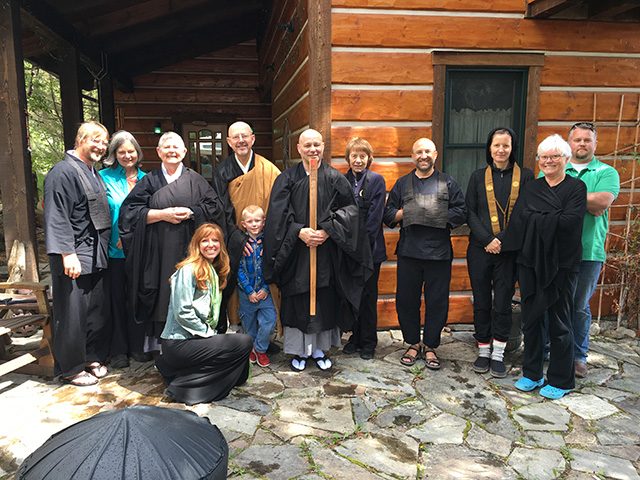
On the Mission Mountain Zen Center patio after Kanzan John Slattery’s ordination ceremony. From the left are Kushin Jim Parker, Lee Wallace, Kuya Nora Minogue, Abby Lambeth, Zenku Smyers Sensei, Colton Lambeth, Kanzan John Slattery, Hadukai Lorraine Smith, Hosen Peter Holocher, Joshin Zea Friesen, Tetsudo Pat May, Scott Lambeth.
Photos by: Kushin, Jim Parker; Zenku, Jerry Smyers
A year of online dharma has unexpectedly helped our rural Montana zendo blossom, and now we’re moving toward hybrid practice carefully, to retain what we have gained.
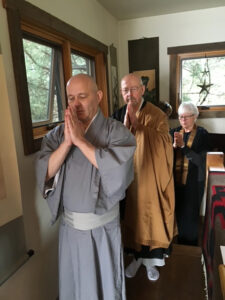
Kanzan John Slattery, Zenku Smyers Sensei, and Tetsudo Pat May walking into the Mountain and Waters Zendo for Kanzan’s priest ordination ceremony.
Mission Mountain Zen Center is launching our first hybrid sesshin (Zen meditation retreat) in July, which will simultaneously bring together people online and in-person. We have been operating only online since early 2020, due to the pandemic.
Located as we are in the Northwest Montana town of Dayton, about 90 miles north of Missoula, we are used to significant geographic challenges in developing a sangha. While Montana is physically the fourth largest state in the United States, we have barely 1 million residents. If you are 100 miles from someone else in Montana, you are considered rather close.
Consequently, prior to the COVID-19 pandemic we were already using Skype and Zoom to help us connect far-flung sangha members. Video conferencing provided us a way to expand our reach and include people, no matter where they live.
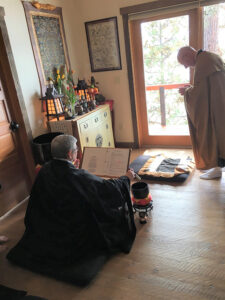
Zenku Sensei bows to the Mountains and Water Zendo altar to start the priest ordination ceremony.
This past year we have utilized online approaches for all of our Zen practice offerings, including weekly zazen (Zen meditation) practice, weekly morning zazen and service (chanting practice), and Zen retreats. Prior to the pandemic we were meeting at a yoga studio in the nearby small town of Polson, but not many local people took advantage of the offering.
While nothing can replace the value of studying in-person with a teacher and sangha, the online approach we have been forced to adopt has attracted more people to our weekly practice offerings. With the zendo (practice meeting place) just a click of the mouse away, people from all over the U.S. join every week. We have become accustomed to using Zoom to practice with others.
Mission Mountain Zen is part of the North American Silent Thunder Order (STO), which is in the Zen lineage of Soyu Matsuoka Roshi and Kosho Uchiyama Roshi. Taiun Michael Elliston Roshi, STO abbot and guiding teacher of the Atlanta Soto Zen Center, formally created STO in 2010 with several of his students.
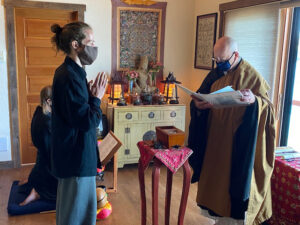
During Jisho Sawyer Hitchcock’s (receiving the precepts) Jukai ceremony. Pictured Kushin Jim Parker, Jisho Sawyer Hitchcock, Zenku Smyers Sensei.
Through STO we also offer annual meditation retreats, dharma talks, dharma study, and individual practice discussions with teachers. Over the past year and a half, all STO activities have been conducted via Zoom.
The Mission Mountain Zen approach to bringing back some in-person practice, which will be to open little-by-little by blending of in-person and online options, will be implemented with considerable care.
At this point people are fatigued with our pandemic-forced physical isolation, thinking direct contact with other Zen practitioners will be most beneficial. In addition, some activities are clearly better face-to-face.
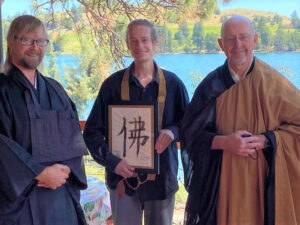
After Hitchcock’s Jukai ceremony. In the picture in front of Flathead Lake is Kushin Jim Parker, Jisho Sawyer Hitchcock, Zenku Smyers Sensei.
For example we want to honor the in-person aspects of our jukai ceremony, where a student formally receives the bodhisattva precepts, guidelines for practice, and embarks on the Buddha’s path. Another is the zaike ceremony, where a student begins to serve the sangha more fully, becomes a formal student of a teacher, and trains for Zen priesthood.
The pandemic has limited our ability to come together for these ceremonies, which is a significant reason we’ve decide to proceed with our hybrid Zen approach starting this July. Our plan is for a three-day retreat around the July 10 weekend, offering both jukai and zaike ceremonies for prepared students.
Students from across the U.S. are planning to participate both online and in person, with the in-person restricted to those who have received the COVID-19 vaccine.

Zenku Sensei teaches, aided by Socks the cat.
My own practice in Zen Buddhism began in the early 1970s as I was finishing college at Western Illinois University. With all the deep social unrest at that time, stemming from civil rights injustice, the Vietnam war, and political assassinations, and then finally the unexpected and sudden death of my best friend, my father, I found myself in need of help in clearing my confusion and finding my way.
At the urging of several good friends, I decided to try Zen meditation. This was a turning point in my life that led me to my first Zen teacher, Kongo Langlois Roshi, abbot of the Zen Buddhist Temple of Chicago. The temple was founded by Soyu Matsuoka Roshi in 1949.
I began studying with Kongo Roshi formally in 1976, and then continued as an ordained Zen priest in 1982. I studied with and helped Kongo Roshi at the temple until his passing in 1999.
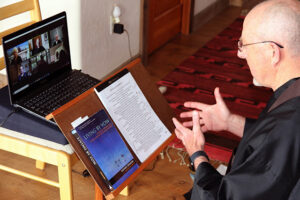
Zenku Sensei teaching via Zoom.
In 2012 I received transmission from Taiun Elliston Roshi, another disciple of Matsuoka Roshi. Elliston Roshi had received dharma transmission from both Soyu Matsuoka Roshi and Shohaku Okumura Roshi.
In 2005 my wife Teresa and I took a leap of faith, and moved from Chicago to Montana. We wanted to be out West and in a less urban area in the mountains as we approached retirement.
The beauty of northwest Montana had spoken to us when we had vacationed here with our daughters Grace and Abby, but we also moved here to offer Zen practice to others. My 30 years studying at the Zen Buddhist Temple of Chicago was a very important experience for me, and I wanted to offer something commensurate to others.
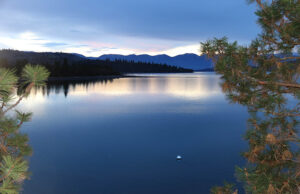
Montana’s Flathead Lake from the Mountains and Water Zendo.
My Zen journey has shed much light and allowed me to see more clearly the path ahead. Regardless of our circumstances Zen Practice is cultivating living fully and wholeheartedly in the present, with zazen as a foundational practice, and allowing this mindfulness practice to guide us throughout our lives.
May this Zoom/in-person hybrid approach allow us to share Buddha’s Wisdom with all beings, using the most skillful means possible.
For additional information about the Mission Mountain Zen Center and STO please visit www.missionmountainzen.org and www.storder.org.
Zenku, Jerry Smyers is a Soto Zen priest in the Lineages of Soyu Matsuoka Roshi and Shohaku Okumura Roshi. Zenku began his training as a disciple of Kongo Langlois Roshi, abbot of the Zen Buddhist Temple of Chicago, in 1976. In 2005 Zenku moved to Montana and established the Mission Mountain Zen Center in Dayton.
In 2010 Zenku became a disciple of Taiun Elliston Roshi, abbot of the Atlanta Soto Zen Center, and a dharma heir of Matsuoka Roshi and Okumura Roshi from the Uchiyama Lineage. In 2012 Zenku received dharma transmission from Taiun Roshi. Zenku is a member of the Silent Thunder Order Zen lineage founded by Matsuoka Roshi, and a member of Soto Zen Buddhist Association.
